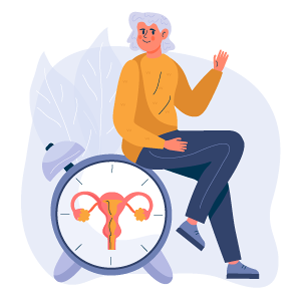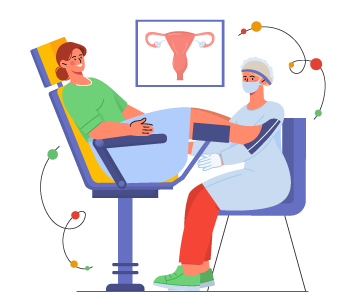
What is Menopause?
Menopause marks the natural end of a woman’s menstrual cycle. It’s diagnosed after 12 months without a menstrual period. Typically occurring in the late 40s or early 50s, menopause signifies the permanent cessation of ovulation (egg release) and a decline in estrogen and progesterone production by the ovaries.
Menopause Symptoms
The hormonal changes associated with menopause can trigger various symptoms, including:
- Vasomotor symptoms (hot flashes and night sweats): Sudden feelings of warmth, flushing, and sweating, often accompanied by heart palpitations.
- Vaginal dryness and discomfort: Reduced estrogen levels can cause vaginal dryness, making intercourse painful and affecting bladder control.
- Irregular periods: Periods may become lighter, heavier, or skip altogether in the years leading up to menopause.
- Sleep problems: Difficulty falling asleep, staying asleep, or experiencing restless sleep can be common.
- Mood changes: Irritability, anxiety, and mild depression can occur due to hormonal fluctuations.
- Changes in physical appearance: Weight gain, thinning hair, and dry skin can be associated with menopause.
Not all women experience all these symptoms, and the severity can vary significantly.


Complications After Menopause
While not immediate consequences, menopause can increase the risk of certain health concerns over time:
- Osteoporosis: Reduced estrogen levels can lead to decreased bone density, increasing the risk of osteoporosis and fractures.
- Heart disease: The risk of heart disease can increase after menopause due to hormonal changes.
- Urinary tract infections (UTIs): Vaginal dryness and changes in vaginal flora can make women more susceptible to UTIs.
Treatment options for Menopause
Menopause treatment options include hormone replacement therapy (HRT) to alleviate symptoms like hot flashes and night sweats, lifestyle changes such as a balanced diet and regular exercise, and non-hormonal medications like antidepressants for mood swings. Additionally, vaginal estrogen can address vaginal dryness, while alternative therapies such as acupuncture and herbal supplements may provide relief for some women. Regular consultations with a healthcare provider are essential to tailor treatment plans to individual needs and monitor for potential risks associated with certain therapies.

FAQs
2. Can Menopause Cause Weight Gain?
Weight gain is a common concern during menopause. While hormonal changes can affect metabolism and fat distribution, other factors like diet, exercise, and age can also play a role. Maintaining a healthy lifestyle with balanced nutrition and regular physical activity can help manage weight gain during this transition.
